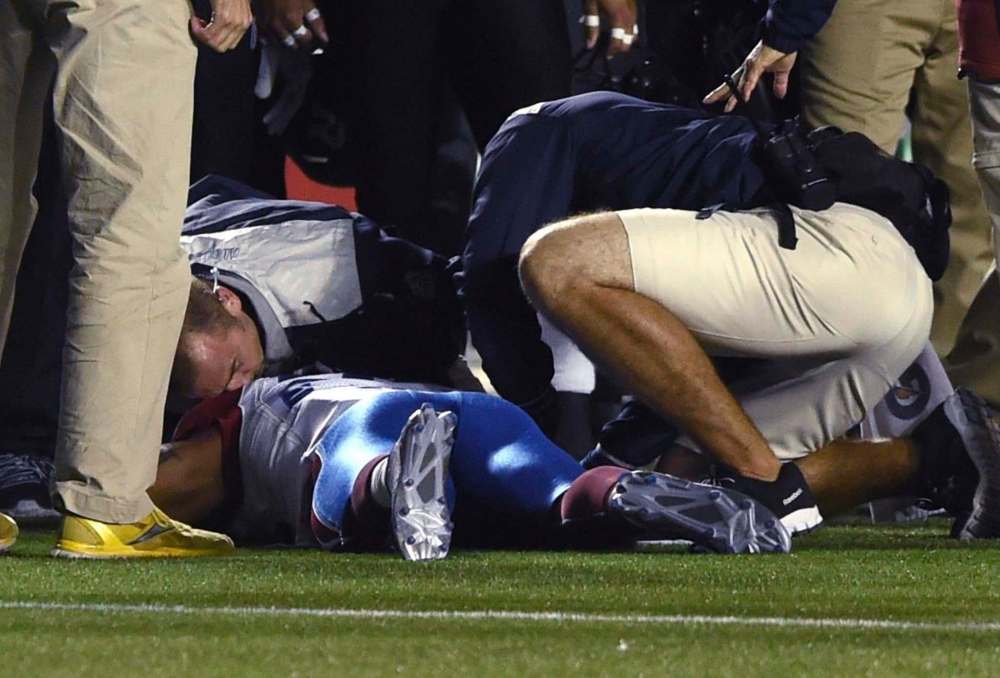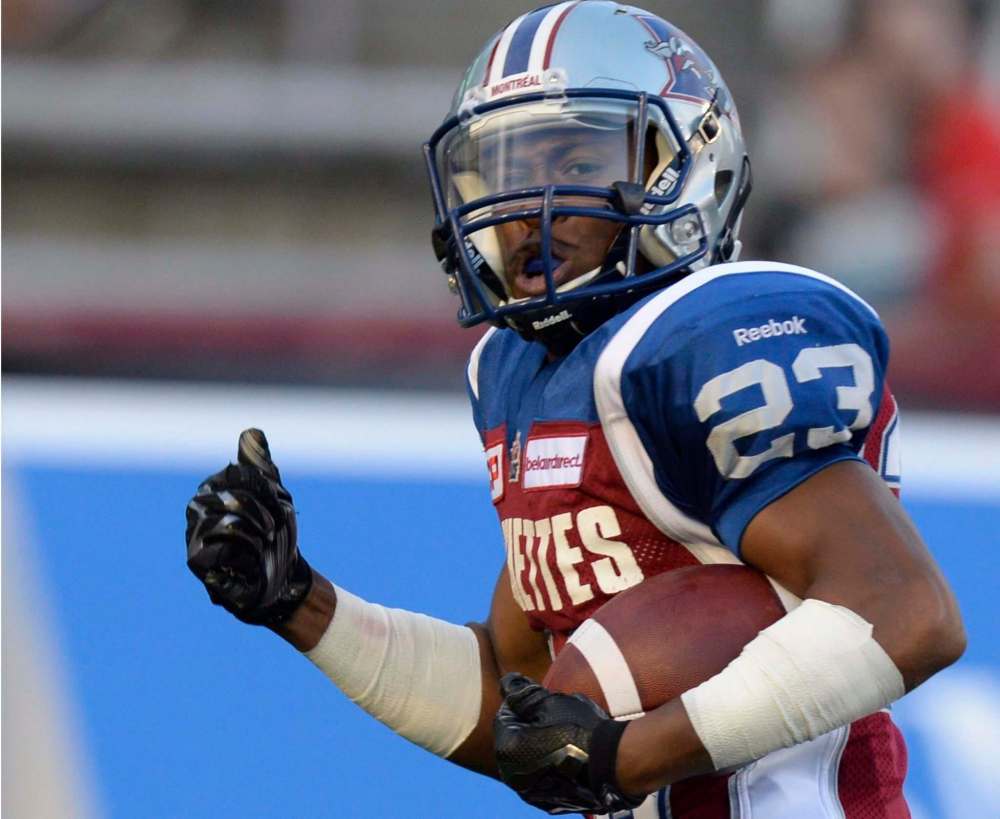Working to heal the system
Pro football players want same WCB coverage as other employees in Canada
Advertisement
Read this article for free:
or
Already have an account? Log in here »
To continue reading, please subscribe:
Monthly Digital Subscription
$1 per week for 24 weeks*
- Enjoy unlimited reading on winnipegfreepress.com
- Read the E-Edition, our digital replica newspaper
- Access News Break, our award-winning app
- Play interactive puzzles
*Billed as $4.00 plus GST every four weeks. After 24 weeks, price increases to the regular rate of $19.00 plus GST every four weeks. Offer available to new and qualified returning subscribers only. Cancel any time.
Monthly Digital Subscription
$4.75/week*
- Enjoy unlimited reading on winnipegfreepress.com
- Read the E-Edition, our digital replica newspaper
- Access News Break, our award-winning app
- Play interactive puzzles
*Billed as $19 plus GST every four weeks. Cancel any time.
To continue reading, please subscribe:
Add Free Press access to your Brandon Sun subscription for only an additional
$1 for the first 4 weeks*
*Your next subscription payment will increase by $1.00 and you will be charged $16.99 plus GST for four weeks. After four weeks, your payment will increase to $23.99 plus GST every four weeks.
Read unlimited articles for free today:
or
Already have an account? Log in here »
Hey there, time traveller!
This article was published 04/10/2017 (2929 days ago), so information in it may no longer be current.
It’s a request that seems as simple and obvious as it would be life-changing. But for Jeff Keeping, the president of the Canadian Football League Players’ Association, finding common ground with the CFL on ways to best protect its players has been anything but clear sailing.
It’s been a two-year journey since Keeping and the CFLPA first started talking to various levels of government and developing outreach campaigns to better educate players and fans of a cause they feel “is the most critical in the game right now.” Given how many hundreds of hours that have been dedicated in pursuit of change, you’d think they were asking for something much bigger than what is already offered to nearly every person working in this country.
That is, everyone except for professional football players.

“If you’re hurt at your workplace it’s the duty of the employer to make sure you’re made whole again and rehabilitated from that injury,” Keeping said in a phone interview Wednesday. “All our guys are potentially one play away from a serious injury… we just think it’s completely fair to ask that we get treated like every other employee in Canada.”
As it stands, players in the CFL aren’t protected from the worst-case scenario. While millions around the country are able to go to work each morning knowing in the event of a catastrophic injury they’d be covered by their employer, those playing in the CFL don’t possess that comfort.
That’s because when it comes to access to coverage by the Workers Compensation Board (or similar bodies known in other provinces by slightly different names), professional football players are among the few in the country that don’t quality for benefits.
Instead, teams offer players a 12-month window of coverage that lasts exactly a year from the day they’re injured. That means in the event of an injury so serious that it involves multiple surgeries, followed by months of rehab, teams are only obligated to provide help for that designated time. After that, it’s no longer their problem.
“The main crux of this issue is it’s the responsibility of the employer, as it is for every other employer in Canada, to take care of their employees if they’re hurt in the workplace,” Keeping said. “If ownership and the league want to stand behind the fact that professional athletes are not covered, are excluded from WCB coverage, then we believe it is then their responsibility to find a solution.”
So far, that task has been strictly the CFLPA’s responsibility to find.
While the NHL, NFL and NBA all have different compensation structures built-in to protect players with long-term injuries, Keeping said it can be a fight just to have their voices heard. But that doesn’t mean they haven’t tried.
In August 2016, the CFLPA submitted a Workers Compensation Board application to the Alberta government during an open-review process. Keeping said the players have prepared the proper documents since then to make similar applications in every other province across the country. They’ve also met with sports ministers at both the federal and provincial levels of government. In March, they broke ground on the #1PlayAway initiative, which is aimed at bringing awareness to fans and players about the lack of coverage teams are offering their players in the event of serious injury.
The initative, while mainly focused on the lack of medical coverage for players in the CFL, also was designed to set the record straight regarding some common misconceptions about what the CFLPA is seeking. Keeping said some have approached him about why the CFLPA hasn’t negotiated this into its contract.
“We don’t believe (what) should be part of collective bargaining is a player having to negotiate whether he’s fully healed and rehabilitated from an injury playing the game,” Keeping said.
Many believe asking to be part of the WCB would put taxpayers on the hook for any extra costs in recovery when it’s the exact opposite, Keeping added, with employers responsible for funding such programs. Also, as things now stand, if a player does need extra medical care, he’s often forced to go through public health care — at least in Canada — and that would put a stress on the system and affect taxpayers.
“We’re not asking for extended health benefits… that’s not what we’re targeting here,” Keeping said. “Those do and should be negotiated in the CBA.”
The CFLPA has met with league representatives, including a number of meetings with commissioner Randy Ambrosie as early as two weeks ago. Ambroise and the league office declined to comment for this story.
Keeping believes player safety remains an important issue to Ambrosie, who played in the CFL from 1985 to 1993, but he also understands each side has a job to do, with money the decisive issue.

“This is something that is critically important and something that shouldn’t wait until bargaining or be a part of the collective bargaining process because every time our players are on the field they’re at risk for suffering one of these types of injuries,” Keeping said. “The game of football, you can suffer a lot of different injuries and you’re career might be over but we want our guys to be physically able to go and get the jobs that they like to do next and be able to move on with their lives in once piece, to contribute to society.”
Of all the efforts that have been made in the last two years, perhaps none have brought more awareness to the issue than the story of Jonathan Hefney, who rose from relative obscurity this week to share his story. In a tale first told in the Ottawa Citizen, Hefney documented his current struggle after sustaining a season-ending neck injury on Oct. 1, 2015, while a member of the Montreal Alouettes.
Hefney was injured while tackling Ottawa Redblacks fullback Patrick Lavoie. To fully recover, he needed three surgeries, only one of which fit within the 12-month window. The first procedure cost $88,000, with 90 per cent covered by insurance and 10 per cent paid by the Alouettes as an insurance deductible. By the time his post-surgery rehab ended, it was beyond one year and no longer the responsibility of the Alouettes.
After an outpouring of support from the public, Hefney decided to create a GoFundMe page to help pay for the surgery bills. By Wednesday afternoon, he had raised nearly $8,500, or just more than 10 per cent of his $80,000 goal. The damage to the nerves around his neck is so bad he still can’t use his right arm.
“In our minds as players we never want to get to that point where we’re asking the public for help for an injury that happened at work,” said Winnipeg Blue Bombers offensive lineman Pat Neufeld, who acts as the team’s player rep for the CFLPA.
“All throughout Canada, you get hurt at work you have full coverage until you’re fully rehabilitated, and as players we feel we should have that same ability to feel normal again after our careers are done.”
In May 2016, Hefney signed a one-day contract with the Winnipeg Blue Bombers, the team he started his seven-year CFL career with in 2009, to officially announce his retirement. When he returned to Winnipeg for this year’s season opener, only his spirits were in good shape.
“I tried to dap him up on the right side and he just gave me the left hand to dap. The idea of ‘one play away’ is real-life. You don’t really think about it until it happens to someone you’re playing with and then you think that could be me,” said Bombers cornerback Chris Randle, a former teammate of Hefney’s with Calgary.
“I hope this gets the recognition it deserves because the story needs to be heard from the people that need to hear it. Our main goal is to make everyone to feel the same way about this subject and I don’t think we all do yet because otherwise we wouldn’t be in this situation.”
jeff.hamilton@freepress.mb.ca Twitter: @jeffkhamilton

Jeff Hamilton
Multimedia producer
Jeff Hamilton is a sports and investigative reporter. Jeff joined the Free Press newsroom in April 2015, and has been covering the local sports scene since graduating from Carleton University’s journalism program in 2012. Read more about Jeff.
Every piece of reporting Jeff produces is reviewed by an editing team before it is posted online or published in print — part of the Free Press‘s tradition, since 1872, of producing reliable independent journalism. Read more about Free Press’s history and mandate, and learn how our newsroom operates.
Our newsroom depends on a growing audience of readers to power our journalism. If you are not a paid reader, please consider becoming a subscriber.
Our newsroom depends on its audience of readers to power our journalism. Thank you for your support.









